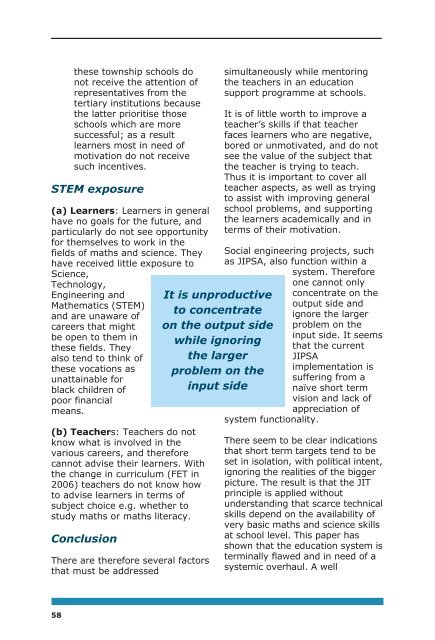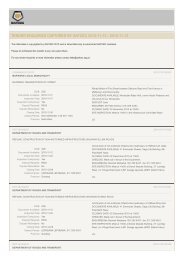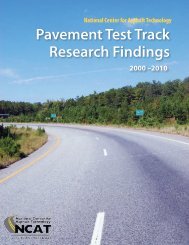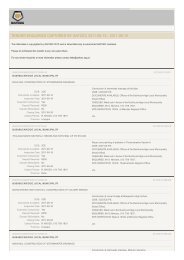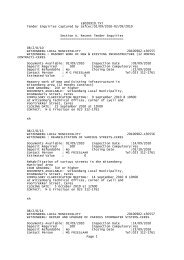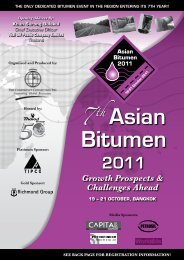DIGEST 2006 - Sabita
DIGEST 2006 - Sabita
DIGEST 2006 - Sabita
Create successful ePaper yourself
Turn your PDF publications into a flip-book with our unique Google optimized e-Paper software.
these township schools do<br />
not receive the attention of<br />
representatives from the<br />
tertiary institutions because<br />
the latter prioritise those<br />
schools which are more<br />
successful; as a result<br />
learners most in need of<br />
motivation do not receive<br />
such incentives.<br />
STEM exposure<br />
(a) Learners: Learners in general<br />
have no goals for the future, and<br />
particularly do not see opportunity<br />
for themselves to work in the<br />
fields of maths and science. They<br />
have received little exposure to<br />
Science,<br />
Technology,<br />
Engineering and<br />
Mathematics (STEM)<br />
and are unaware of<br />
careers that might<br />
be open to them in<br />
these fields. They<br />
also tend to think of<br />
these vocations as<br />
unattainable for<br />
black children of<br />
poor financial<br />
means.<br />
(b) Teachers: Teachers do not<br />
know what is involved in the<br />
various careers, and therefore<br />
cannot advise their learners. With<br />
the change in curriculum (FET in<br />
<strong>2006</strong>) teachers do not know how<br />
to advise learners in terms of<br />
subject choice e.g. whether to<br />
study maths or maths literacy.<br />
Conclusion<br />
There are therefore several factors<br />
that must be addressed<br />
It is unproductive<br />
to concentrate<br />
on the output side<br />
while ignoring<br />
the larger<br />
problem on the<br />
input side<br />
simultaneously while mentoring<br />
the teachers in an education<br />
support programme at schools.<br />
It is of little worth to improve a<br />
teacher’s skills if that teacher<br />
faces learners who are negative,<br />
bored or unmotivated, and do not<br />
see the value of the subject that<br />
the teacher is trying to teach.<br />
Thus it is important to cover all<br />
teacher aspects, as well as trying<br />
to assist with improving general<br />
school problems, and supporting<br />
the learners academically and in<br />
terms of their motivation.<br />
Social engineering projects, such<br />
as JIPSA, also function within a<br />
system. Therefore<br />
one cannot only<br />
concentrate on the<br />
output side and<br />
ignore the larger<br />
problem on the<br />
input side. It seems<br />
that the current<br />
JIPSA<br />
implementation is<br />
suffering from a<br />
naïve short term<br />
vision and lack of<br />
appreciation of<br />
system functionality.<br />
There seem to be clear indications<br />
that short term targets tend to be<br />
set in isolation, with political intent,<br />
ignoring the realities of the bigger<br />
picture. The result is that the JIT<br />
principle is applied without<br />
understanding that scarce technical<br />
skills depend on the availability of<br />
very basic maths and science skills<br />
at school level. This paper has<br />
shown that the education system is<br />
terminally flawed and in need of a<br />
systemic overhaul. A well<br />
58


